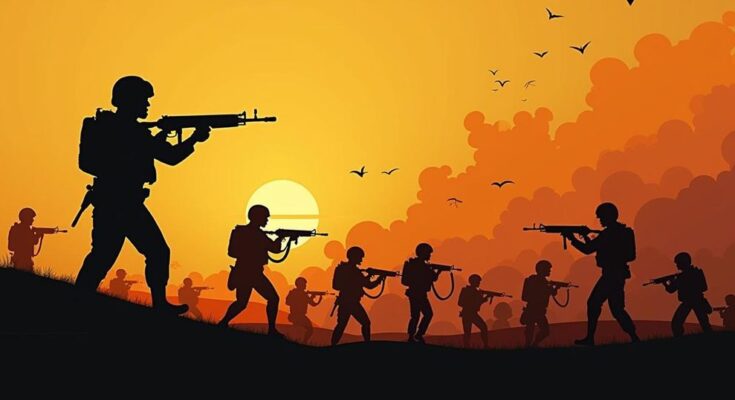Hezbollah is currently in conflict with Israeli established forces in Lebanon and Israel is intensifying its military operations in Gaza. Following Iranian missile strikes on Israel, global leaders are expressing concerns, with implications for regional stability and security. Israel prepares a military response amid escalating tensions, while political figures emphasize the need for dialogue to prevent wider conflict.
Hezbollah is engaged in armed conflict with Israeli forces in Lebanon, coinciding with increased military actions by Israel in Gaza. Reports from Israeli media indicate that helicopters are evacuating injured soldiers following a Hezbollah assault in southern Lebanon. Andreas Krieg, a senior lecturer at King’s College London, remarked that any Israeli military response aimed at Iran is unlikely to achieve its objective of damaging Iran’s deeply buried nuclear facilities. He highlighted that the recent Iranian attack is more significant than previous engagements, suggesting that Israel’s retaliation must be substantial. Krieg asserted, “I don’t see how attacks on non-military sites, such as oil refineries, would have any impact or be any way justified as a form of response to this strike yesterday.” Amidst escalating tensions, Italian Prime Minister Giorgia Meloni announced a Group of Seven leaders’ call to discuss the crisis, expressing deep concern over Iran’s missile strikes against Israel and the volatility in Lebanon. Meanwhile, Jordan has vowed to prevent its territory from becoming a battleground, with government spokesperson Mohammad Momani stating, “Protecting Jordan and Jordanians is our first responsibility.” Jordan has also moved to secure its airspace after Iran launched numerous ballistic missiles in retaliation for actions taken against Gaza, injuring three individuals when some fragments landed within Jordanian territory. Reports confirmed that Israeli troops crossed the Blue Line into Lebanese territory before retreating. The Lebanese army stated this intruded approximately 400 meters into Lebanon before its withdrawal. India has expressed strong concern over the rising conflict, urging for restraint and dialogue to prevent a broader regional confrontation. Israel, in response to Iranian missile attacks, pledged military retaliation against key Iranian military sites. Israeli Foreign Minister Israel Katz has also barred UN Secretary-General Antonio Guterres from the country due to his failure to adequately condemn Iran’s missile assaults.
The conflict between Hezbollah and Israel has historical roots, intensified by regional dynamics involving Iran and its allies. Recently, tensions escalated significantly, as Iran launched missile strikes against Israel in response to the ongoing violence in Gaza and Lebanon. This recent escalation reflects a complex interplay of military strategies and geopolitical maneuvers among Israel, Iran, and Hezbollah, marking a critical junction in Middle Eastern conflicts. The responses and stances of various nations, particularly Jordan and India, highlight the potential for broader regional implications resulting from this confrontation.
In summary, the ongoing conflict between Hezbollah and Israeli forces reflects heightened military activity amidst Iran’s retaliatory missile strikes against Israel. As nations express concern over the escalation, the focus remains on military strategies and their implications for regional stability. Political figures are navigating these developments, with significant repercussions anticipated for diplomatic relations and security in the Middle East.
Original Source: www.aljazeera.com




